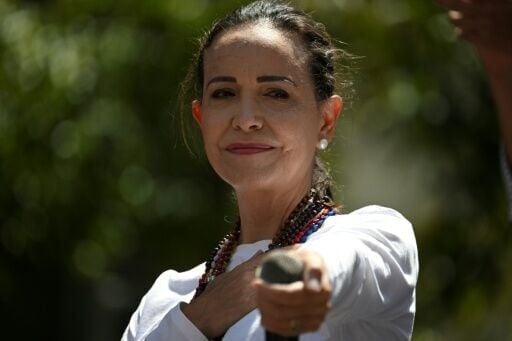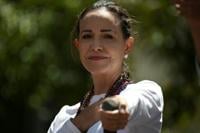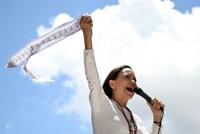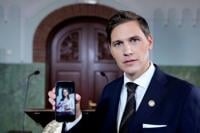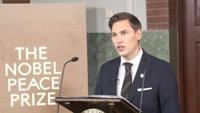The Nobel Peace Prize was awarded Friday to Venezuelan opposition leader Maria Corina Machado, who dedicated the award to the Venezuelan people -- and to US President Donald Trump.
Machado, the democracy activist who fronted the campaign to end President Nicolas Maduro's authoritarian rule in last year's elections, has become a "unifying" figure in Venezuela, the jury said.
She has refused to leave despite threats against her life.
She dedicated her award to the "suffering people of Venezuela" and, in a surprise move, to Trump, who had long coveted it, citing his "decisive support of our cause".
"More than ever we count on President Trump," she wrote on X, a month into a major US military buildup near Venezuela's shores and a campaign of deadly strikes on suspected drug boats.
Machado, 58, told Nobel Institute director Kristian Berg Harpviken, who called her with news of her prize, she was confident of a peaceful transition to democracy in Venezuela.
"I'm sure that we will prevail," she said in the call, which was filmed and posted to X.
The trained engineer, in hiding for the past year, is "one of the most extraordinary examples of civilian courage in Latin America in recent times", said Nobel Committee chair Jorgen Watne Frydnes.
Venezuelan opposition figurehead, Edmundo Gonzalez Urrutia, who lives in exile in Spain, hailed her win as "a well-deserved recognition of the long struggle of a woman and an entire people for freedom and democracy".
Within Venezuela, however, some people were openly critical of the award.
"That woman has done nothing for peace in Venezuela," Pedro Gonzalez, a 68-year-old pensioner in Caracas grumbled.
"All she has done is call for protests, call for riots, and all that sort of thing."
Venezuela's ambassador to the United Nations joked that Machado was no more qualified to win a Peace Nobel than a Physics Nobel.
But in Argentina, home to some of the millions of Venezuelans who have fled the country's economic meltdown under Maduro, there were celebrations.
Maria Angel Navas, a 31-year-old Venezuelan lawyer and activist, called the prize an "endorsement and recognition of a struggle that has been ongoing for years."
- Rock-star politician -
Machado was the opposition's presidential candidate for Venezuela's 2024 elections, but Maduro's government blocked her candidacy.
She then backed the reluctant, little-known ex-diplomat Gonzalez Urrutia as her stand-in, accompanying him on rallies where she was welcomed like a rock star.
Maduro claimed electoral victory, but only a handful of countries recognised his win.
Caracas-born Machado entered politics in 2002 at the head of the association Sumate (Join us), pushing for a referendum to recall Maduro's mentor, the late socialist leader Hugo Chavez.
The call led to treason accusations and death threats, prompting her to send her three children to live abroad.
The committee said it was aware Machado might not be able to attend the Oslo ceremony on December 10.
The award comes a month into a US campaign of military pressure on Maduro's government, including strikes on boats in waters near Venezuela alleged to be carrying drugs.
Washington accuses Maduro of leading a drug cartel, which he denies.
Machado and Gonzalez Urrutia have backed the US pressure on his government as a "necessary measure" towards the "restoration of popular sovereignty".
- Trump's dashed hopes -
Machado was not among those mentioned as possible laureates in the run-up to Friday's announcement
Yet, hours before the prize was awarded, the odds of her getting it soared from 3.75 to nearly 73 percent on the predictive betting platform Polymarket -- triggering an investigation by the Norwegian Nobel Institute into a possible leak.
Once a relatively democratic and prosperous petro-state, Venezuela is now a "brutal authoritarian state that is now suffering a humanitarian and economic crisis", Frydnes said.
Over 7 million Venezuelans -- around one-quarter of the population -- have fled the country's economic meltdown under Maduro.
Since returning to the White House for his second term in January, Trump has repeatedly insisted that he "deserves" the Nobel for his role in resolving numerous conflicts -- a claim observers say is broadly exaggerated.
His office called the committee's decision a sign of "politics over peace".
The committee had, however, made its choice days before the announcement of the deal he brokered to end the fighting in Gaza.
phy/po-cb/phz



